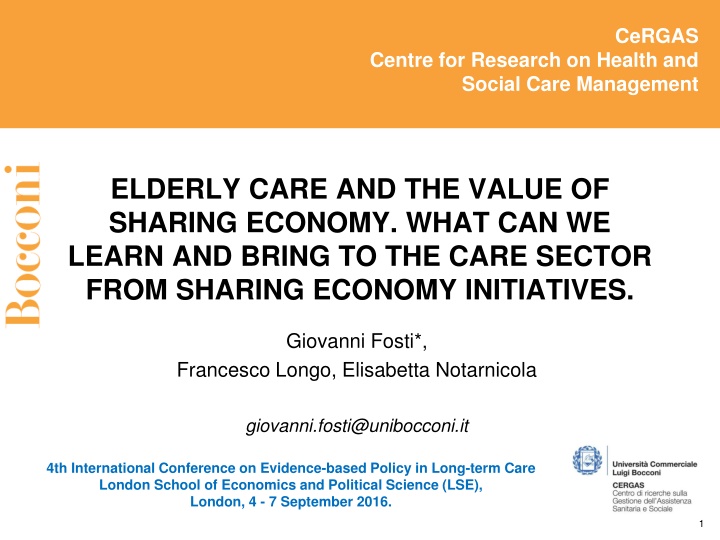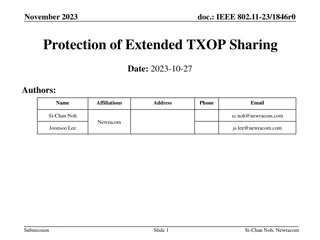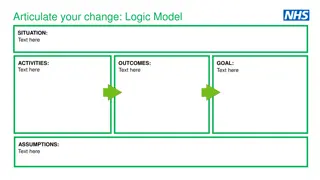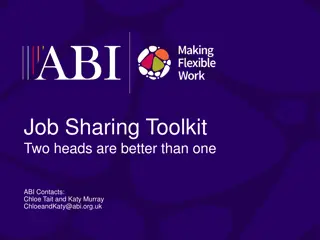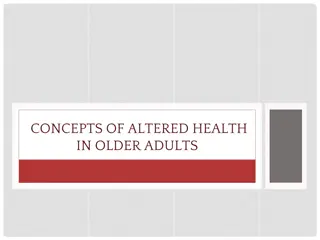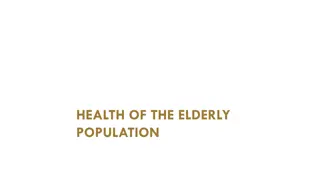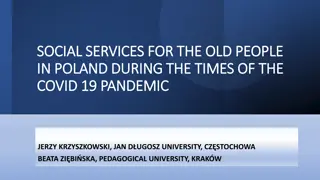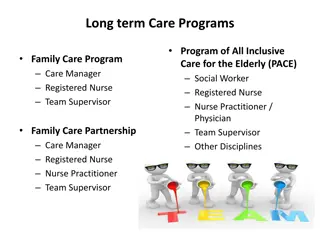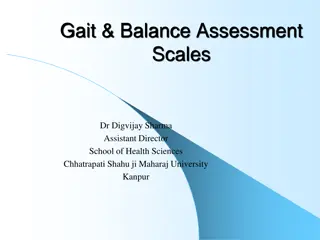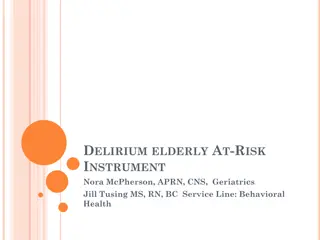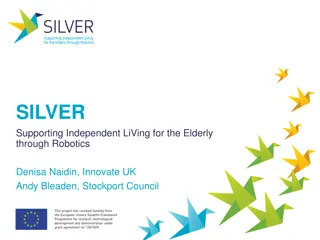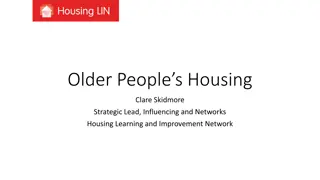The Value of Sharing Economy in Elderly Care Management
The research discusses the advantages of incorporating collaborative and sharing economy concepts in the elderly care sector to address challenges faced by traditional welfare systems. It explores the potential of flexibility, personalization, resource aggregation, trust building, and technology in improving care services for the elderly population. Insights from the 4th International Conference on Evidence-based Policy in Long-term Care shed light on innovative approaches to enhance the quality of care for seniors.
Download Presentation

Please find below an Image/Link to download the presentation.
The content on the website is provided AS IS for your information and personal use only. It may not be sold, licensed, or shared on other websites without obtaining consent from the author.If you encounter any issues during the download, it is possible that the publisher has removed the file from their server.
You are allowed to download the files provided on this website for personal or commercial use, subject to the condition that they are used lawfully. All files are the property of their respective owners.
The content on the website is provided AS IS for your information and personal use only. It may not be sold, licensed, or shared on other websites without obtaining consent from the author.
E N D
Presentation Transcript
CeRGAS Centre for Research on Health and Social Care Management ELDERLY CARE AND THE VALUE OF SHARING ECONOMY. WHAT CAN WE LEARN AND BRING TO THE CARE SECTOR FROM SHARING ECONOMY INITIATIVES. Giovanni Fosti*, Francesco Longo, Elisabetta Notarnicola giovanni.fosti@unibocconi.it 4th International Conference on Evidence-based Policy in Long-term Care London School of Economics and Political Science (LSE), London, 4 - 7 September 2016. 1
Traditional welfare vs innovation Western welfare systems are collapsing: Symptoms: Welfare based on single performances rather than continuous care Welfare stucked in traditional policies, not capable to meet new emerging needs (i.e. integration and immigration) Reaching ability unsufficient to provide answers to all the citizens in need Equity problem not solved yet Funding crisis not solved yet 2
What collaborative / sharing economy is? (1) Collaborative economy: Economy based on networks where people and resources of all kind are interconnected. This lead to new / different: - Production mechanisms (both for goods and services) - Consumption mechanisms (both for goods and services) - Financial and non financial resources - Knowledge and competences required Rachel Botsman, What s mine is yours (2010) 3
What collaborative / sharing economy is? (2) Sharing economy: Sharing of assets of all kind that would be underemployed following traditional production / consumption mechanisms and that create positive value if shared 4 pillars: 3 keywords: 1. Critical mass: it doesn t work for small numbers of users There must be some underemployed productive capacity Transactions are based on the sharing of something Trust is essential - Goods / services / assets 2. - Brokerage / platform - Financial and non financial resources 3. 4. Rachel Botsman, What s mine is yours (2010) 4
What can collaborative / sharing economy bring to welfare? More flexibility and personalisation Through the sharing flexibility and personalisation are more accessible and less expensive: answering to individual needs would be easier More resources, less scarcity Through the sharing existing resources (financial and non financial) would be aggregated and would benefit of different type of economies: more possibilities to reach citizens Trust for the economy and the community Sharing mechanisms are based on trust and collective action and generate in turn trust and collective action. More trust and social relation would produce positive spill over for many aspects of the community life Switch to web based technology Sharing platform are mainly based on web systems allowing to reach more people with less money (not effort):more equity in the welfare system 5
Which differences between shared services and traditional welfare services ? Traditional welfare services Shared services Service features Given Open to changes Providers makers Broker Service design Planned ex ante Emerging Production logic Retrenchment Growth Technology Peripheral Core Social priority Need assesments Citizens in charge Self - selection Control Administrative Social Successful if Contain expenditure Generate resources Promoted by Public authority Community 6
3 possible examples for LTC and Welfare: Welfare Tripadvisor Silver age connection Backup Caregiver Examples provided from existing experiences 7
Welfare tripadvisor Obj: platform where it would be possible to exchange information an evaluation about public and privare welfare services with a user oriented mechanism. Service feature Counselling Orientiring Balance between work and caring activities More trust and transparency in welfare services NEED TO SATISFY A district A given geographical area CRITICAL MASS Brokerage thruogh existing social channels: schools, etc.. Incentives Mass media HOW TO REACH THE CRITICAL MASS Schools Social meeting places Websites PLATFORMS Mothers Families Young .. TARGETS 8
Silver age connection Obj: platform where elderlies in good health can meet to join leisure, cultural, sports activities to support active ageing and find new opportunities Service feature Alone elderlies Poor elderlies Active elderlies .. NEED TO SATISFY Geographical area? Team? .. CRITICAL MASS Professionals groups? neighbourhood? GPs? HOW TO REACH THE CRITICAL MASS Public libraries Newspapers web PLATFORMS Elderlies Elderlies families TARGETS 9
Backup caregiver Obj: sharing of caregivers to provide a backup solution to more families with less expenditure. Service feature Flexibility for care at home Safety net in case of emergency Sharing of the expenditures for personal caregivers NEED TO SATISFY Neibourhood? CRITICAL MASS Prevention activities GPs HOW TO REACH THE CRITICAL MASS Buildings web PLATFORMS Families Elderlies? TARGETS 10
Conclusions Sharing economy is a good possibility to promote innovation in the LTC sector and, more broadly, in the welfare sector. Sharing economy services won t substitute traditional care services but they can contribute to active ageing efforts and supportive care services. Sharing economy is not the way to solve the welfare issue but it can help to promote a more inclusive society and to provide welfare services to a broader group of citizens. 11
